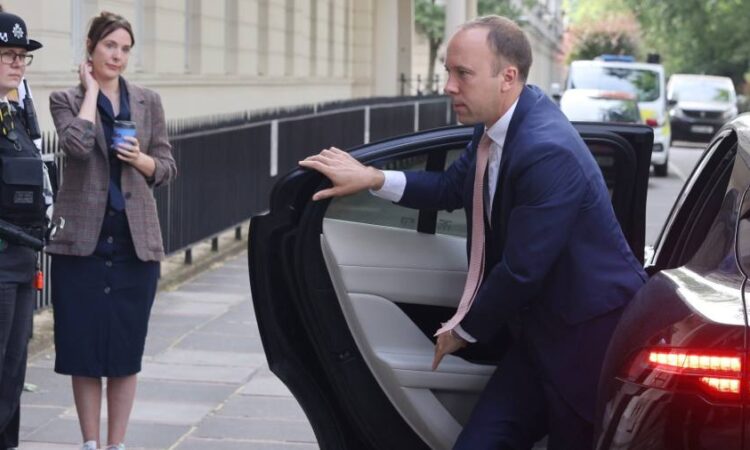
Receive free UK Covid inquiry updates
We’ll send you a myFT Daily Digest email rounding up the latest UK Covid inquiry news every morning.
The UK’s approach to pandemic planning was based on a flawed strategy that prioritised clearing up after a disaster over attempting to prevent one, former health secretary Matt Hancock told the Covid-19 inquiry on Tuesday.
Hancock — who served as health secretary between 2018 and 2021 — said the UK had been too focused on acquiring “enough body bags and on where to bury the dead”. That worst-case scenario approach dwarfed other flaws in pandemic preparations, including the focus on influenza over other threats, he said, describing the outcome as “an absolute tragedy”.
During several hours of questioning, Hancock also acknowledged that surge planning for the adult social care sector, where many of the early victims of Covid were concentrated, had fallen “far behind”.
Hancock, who was forced to resign in 2021 after breaking the government’s social-distancing guidance by kissing then aide Gina Coladangelo in his office, was giving evidence about his role in the run-up to the outbreak of the pandemic in early 2020.
Later modules in the inquiry, which will probe the UK’s pandemic planning and assess the impact of Covid, will address his role in overseeing the Department of Health and Social Care once the disease had struck.
“The central failure that hampered the UK’s response was the refusal and the explicit decision that it would not be possible to halt the spread of a new pandemic,” said Hancock. “All of the other considerations are small — important but small — compared with the colossal scale of failure in the assumption that it would not be possible . . . to stop the spread of a disease.”
Many of the deficiencies that became apparent stemmed from that “systemic failure”, he added. These included the lack of readiness to scale up laboratory testing and contact tracing, or to provide adequate supply of and delivery mechanisms for personal protective equipment and to plan for lockdowns.
Hugo Keith KC, lead counsel for the inquiry, on Tuesday provided documented evidence showing that for a year under Hancock’s watch, the main body charged with pandemic preparedness had ceased to meet. In the same period, Hancock also failed to attend meetings of the subcommittee of the National Security Council, responsible for pandemic planning.
Keith also pointed out that many recommendations resulting from Exercise Cygnus, a major pandemic simulation carried out by the UK in 2016, had not been implemented by early 2020, including provisions supposed to be in place to protect adult social care.
Hancock blamed the latter on the way social care is set up in the UK, with local authorities legally responsible for its provision. While it was accountable, the DHSC did not have the requisite “levers” to act, he said, and did not even know how many care homes were operating when Covid struck.
Hancock blamed other delays in pandemic planning on the diversion of DHSC resources towards addressing the threat posed at the time by a possible no-deal exit from the EU.
But he said preparations for a no-deal Brexit had also ensured the government was on top of pharmaceutical supply chains when the pandemic began and narrowly helped prevent the NHS from running out of intensive care medicines.
Apologising “profoundly . . . for each death that has occurred”, Hancock said he hoped the inquiry would ensure the UK stopped a future pandemic “in its tracks much, much earlier and that we have the systems in place to do that because I am worried that they are being dismantled as we speak”.
He also sought credit for prioritising early in his tenure as health secretary the ramping up of the UK’s capacity to produce its own vaccines to ensure the country would not be reliant on overseas supplies in a chaotic pandemic scenario.
“I insisted we pushed on domestic manufacturing and sought the funding to deliver on that,” he said.



